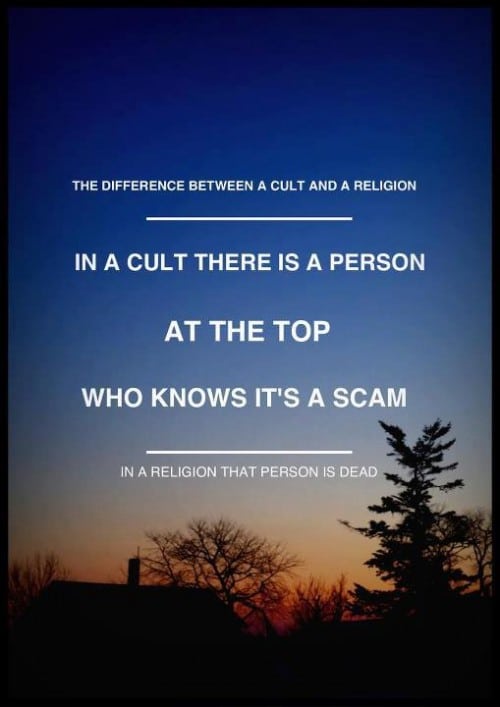[First posted in 2012. When we still functioned under the wide umbrella of “Christ-centered” religion, it baffled us that while all the various denominations worshipped the same trinitarian godhead, some of those denominations were labeled “cults”. As we researched it, we found out that mainstream Christianity considered any “Christian” group/church/fellowship as “cultic” IF it deviated from any of the foundational teachings of the “Church Fathers.” But it was strange to us that the finger-pointing often met each other: Catholics considered breakaway Reformed Protestantism as cultic while Protestants considered Catholics as cultic. The finger-pointing extended to the multiplying groups of evangelicals. Then when “Messianic Judaism” got into the already crowded and confusing picture, it got relegated to the Sabbath-keepers (established religions such as Seventh Day Adventists, Jehovah Witness, etc.), all frowned upon as cultic because they were Saturday-worshippers instead of Sunday-church-goers. Add to the cultic criterion the practice of “Old Testament” prescriptions such as the SDA’s veganism of Genesis 2 instead of the Leviticus 11 clean meat diet prescribed for Israelites. Then, Jesus supposedly declared all food ‘good’ so Christians justify eating unclean meat, conveniently forgetting that Jesus was a Jew who presumably ate the kosher diet so that food for him was already defined in the “OT”. As for Messianics, they virtually try pushing square pegs into round holes, figure that one out. How confusing indeed is the world of organized religion! Throw in as well, unorganized and disorganized religion, sporadic small fellowships organized by self-proclaimed pastors, here, there and everywhere! Enough, we give up!
We have always claimed we are not “a religion” nor “a church” so are we a cult? Christians might conclude so, we know, we used to think like them. Yes, Sinai 6000 is a breakaway group from Christ-centered religion/church/fellowship, so are we then a non-Christian ‘cult’? It depends on who’s asking. Here are our thoughts 5 years ago when this article was first posted; we have not changed our position. You, reader, decide for yourself.
Related posts:
- Revisited: S6K – A Collective Voice for Truth-seeking Gentiles
- Revisit: Are you Jew-wannabes, if not what are you?
- Revisit: How does one understand and obey the TORAH of YHWH in this day and age?
- Q&A: Why do you call yourselves “Sinaites”?
- Revisited: What does the God of Israel require of Gentiles?
- Starting over . . .
- Q&A: What is Sinai6000 about?
- Revisit: Christianity? Judaism? Noachide? How about Sinaite . . . .
—Admin1]
———————————————————–
It was a Rabbi who first told BAN@S6K that a start-up group like Sinaite 6000 will eventually fade out of the scene once the original organizers have passed on and there are no 2nd generation members to continue the work.
Exactly what is the nature of the “work”?
Without resorting to Christian terminology such as “witnessing” or “ministry”, S6K “work” is simply one of teaching anyone who would care to seriously study the TORAH/TNK from the point of view of former Christians/Messianics. S6K offers an approach to reading the Hebrew Scriptures without bringing former Christian orientation and without the influence of Rabbinic interpretation, and yet being open to insights from both sources, as long as they do not deviate from the plain meaning of the text, within its context and never out of context.
In the case of this website, the ‘work’ means not only sharing resources not otherwise easily accessible to seekers/visitors, but also recording the insight-by-insight re-education of a Sinaite as he/she sheds former religious beliefs to start over in getting to know the One True God whose name is revealed in the Hebrew Scriptures as YHWH.
But back to the Rabbi, what exactly was the his recommendation for new ‘movements’ like us who ventured out of the boundaries of Christianity and don’t quite know where to fit in? Just one: join Judaism, a Torah-based already established religion. Some S6K members outside of our city-base have already done just that. For lack of regular weekly teaching from us, they felt the next best recourse is to learn Torah from Jewish teachers and the best place to do that is the local Synagogue if one exists in their city of residence. They have gone through the process of eventually being assimilated in this Jewish religion and they are content in being counted among the remnant’ Torah-observant Israel’; ‘remnant’ because not all Jews are ‘religious’ and in fact so many are secular, some even atheist.
Our core group however are agreed on one thing: that since we are gentiles and not Jews, we need to maintain our identity and stand on a gentile’s place in YHWH’s plan for all humanity. While He did begin with a chosen people, a nation that would live His Torah and model it to the nations, the intention was not to make all peoples ‘Jews’ or even ‘Jewish’, the intent was to make all nations live Torah, and Torah is universal, biblical, not necessarily Jewish nor confined to Israel. So we choose to maintain our gentile-ness, but live Torah as best as we can live its prescribed lifestyle in whatever environment we find ourselves in.
Well, what environment is that?
- For one, a society that is predominantly Christian that views ‘otherness’ as “cultic.” Under this alone, there are many differences: scriptural basis of beliefs, name and nature of God worshipped, to name two foundational issues.
- For another, a work-week schedule that takes a break on Sunday instead of the original sabbath, Saturday.
- For yet another, a food culture that promotes the eating of unclean meat.
- Seasons of feasts or festivals celebrated or commemorated as well as traditions that accompany these.
Let us stop there since these in themselves already tend to ‘isolate’ a Sinaite, so that as individuals who have been used to ‘fellowshipping’ with others of similar beliefs in our former Christian communities, each one now has to seek out a company where he/she might best fit in. Our core group is fortunate we have each other to fellowship with on Shabbat and biblical feasts and seasons; we also spend time discussing our understanding of TORAH, issues that unite us as well as divide us, decisions that we collectively make and publicly share so others might learn from us.
Would a start-up group which is yet untested be a reliable source of information? That is up to our readers to determine for themselves. We are quite honest in admitting we teach as we go along. We have just undergone a transition but whatever we have learned every step of the way, we discuss, scrutinize, then decide to share with others. Obviously there are few takers if any at all, as we had anticipated from the very start. Not even among our families and much less among our friends, and heaven forbid that any of our former Christian colleagues would even hear us out . . . .hence, this website.
Would we be considered a ‘cult’? In the Christian definition, most likely. But there are more things involved in a ‘cult’ which, thankfully, has already been discussed in a Q&A in Aish Ha Torah [Aish.com]. We will just feature the article which best explains the word.

Image from www.criminalizeconservatism.com
Q. Is Aish HaTorah a Cult?
[S6K: highlights and emphasis/underscore added].
I read an article online by cult-buster who claims that Aish HaTorah is a cult. I’ve even heard the term “I’ve been Aish’d.” All the people I’ve met through Aish seem normal and balanced. How can I be sure that you guys aren’t just some Jewish version of Hare Krishna?
A. The Aish Rabbi Replies:
People tend to label anything as a “cult” that challenges them to rethink their belief system.
But if that’s the case, then for a European Socialist, American democracy is a cult.
Of course that notion is absurd.
So let’s define our terms: What is a cult, and how does Aish HaTorah compare to that?
1) Cults always force you to cut off ties with your family. Ask any parents of Aish HaTorah students and they will tell you that they are recipients of more honor and respect from their children than ever before.
2) Cults indoctrinate you not to think for yourself. The very foundation of Aish HaTorah’s philosophy is that a person has to think for themselves and work out rationally the key issues of life. The Torah emphasizes building a rational basis of belief, to engage one’s intellect through questioning and debate. It does not endorse leaps of faith, all-or-nothing decisions or disengagement from the world. Jewish life requires both the mind and heart, but the mind must lead the heart.
The Discovery Seminar is based on this, as are Rabbi Weinberg’s 48 Ways to Wisdom classes. [check out: http://www.aish.com/sp/48w/]
Aish does not use hard-sell because it believes it has the most powerful “product” in the universe – the Torah. As the Almighty’s instructions for living, Torah teaches us how to maximize our pleasure and potential in life. As such, it is the most revolutionary book in history.
Aish helps young Jews see Judaism as a basis to answer the most important questions: How can I live a meaningful life; build successful relationships; deal honestly in business; fulfill my personal potential; really make a difference in the world?
So what does it mean to be Aish’d? It means to become educated. To strengthen one’s Jewish pride through knowledge and understanding. To grow Jewishly, one step at a time. To replace apathy with idealism. To defend Israel. To respect every Jew. To take responsibility for the world, using the Torah as our guide, to fulfill the mission of the Jewish people. And most of all, being Aish’d means to love being Jewish.
If Aish is a cult, then it is the same cult practiced by Abraham, Maimonides and our Bubbies in Europe!




Reader Comments